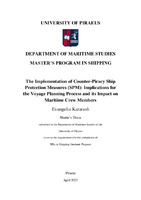The implementation of counter-piracy Ship Protection Measures (SPM) : implications for the voyage planning process and its impact on maritime crew members

Master Thesis
Author
Karatsoli, Evangelia
Καρατσώλη, Ευαγγελία
Date
2025-04Advisor
Theotokas, IoannisΘεοτοκάς, Ιωάννης
View/
Keywords
Maritime piracy ; Voyage planning ; Ship Protection Measures (SPM) ; Crew membersAbstract
Despite the steadily declining number of pirate incidents reported in the last years, piracy continues to pose a significant challenge to maritime operations in various sea routes around the globe. Thus, ship-owners and operators are led to develop a wide range of anti-piracy practices and adopt asset and cargo protective measures towards more effective risk management and incident mitigation. Certain suggested measures, such as the employment of Privately Contracted Armed Security Personnel (PCASP), which has become one of the most widely implemented anti-piracy practices by merchant vessels navigating through high-risk areas to ensure the overall safety of the asset, its people and cargo, raise a number of complex issues related to insurance coverage and ones of legal nature (liability, jurisdiction etc.) for Flag States, ship-owners, operators as well as seafarers. The purpose of this Master’s Thesis is to shed light on the multiple parameters that must be considered by ship-owners and operators during the Risk Assessment process which must be conducted prior to selecting the most suitable counter-piracy Ship Protection Measures to be implemented during a specific voyage. Furthermore, it aims to provide valuable insight into the implications caused by the implementation of these measures on crew members, who constitute one of the most essential elements determining the ship’s smooth operation.


